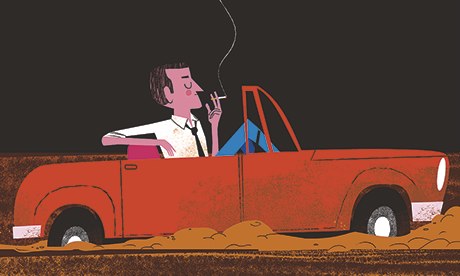
My favourite bit of "meta-advice" – advice on how to deal with the advice that rains down on us from friends, books, columns like this – comes from the novelist Rick Moody. He happened to be talking about writing routines, a topic with which I'm dangerously obsessed, but his wisdom applies to any work, and to relationships and life in general. "The insight I offer you is this," he told the Writeliving blog. "There's no one process, and as soon as I imagine some approach to generating work is foolproof, it becomes suddenly worthless to me, and I have to start over." If, like me, you're always fiddling with your work systems, reorganising your stuff, testing new tricks for cultivating habits… take comfort. One tactic works for a while, then the self-sabotaging part of your brain gets wise to what you're doing, and the cycle begins again. The problem isn't that you've failed to find the One True Secret of productivity, happiness or love. The problem is believing you ever might.
Indeed, there's one view of psychology according to which everything we do to make ourselves miserable – every dysfunctional behaviour, from minor to destructive – begins as an approach that once worked well, often in childhood, then passed its sell-by date. We're not idiots who choose unhappiness; rather, we develop coping mechanisms that make sense at the time. The psychotherapist Suzanne Lachmann recalls a typical patient whose mother was "so volatile that [the patient] never knew if she'd come home to find all her belongings strewn across the front lawn… As a result, [she] developed her own set of rules to navigate these situations, remaining on guard at all times." That's a pro-sanity strategy – until suddenly it isn't. Unfortunately, we often then respond by pursuing the old approach more vigorously. We're like drivers stuck in mud, accelerating and wondering why there's no forward motion.
This trap is what Donald Sull, a London Business School professor, calls "active inertia". Companies do it, too: time and again, he's watched established firms respond terribly to industry changes. They don't adapt nimbly, but nor do they pause to take stock. Instead, "stuck in the modes of thinking and working that brought success in the past, market leaders simply accelerate their tried-and-true activities. In trying to dig themselves out of a hole, they just deepen it." One case study is Laura Ashley, which thrived in the 60s as an alternative to miniskirts and knee-high boots, but floundered as the demand for stylish workplace womenswear grew. Panicking, the firm hired a string of new bosses – the televangelist Pat Robertson even joined the board – but just drew nearer to collapse. It was only much more recently that it made the changes necessary to move on.
What's the answer? This may be a rare case in which business school insights are truly useful outside business. Sull recommends "active waiting". When an old technique's not working, stay watchful. Contemplate alternative techniques, explore likely scenarios and focus on general readiness. (Can't figure out where to go with a relationship? That's OK; for now, try paying attention to exercise and sleep.) There's no shame in not yet knowing what the right next approach will be, and no single path to unbroken happiness anyway. Take it from a man named Moody.
oliver.burkeman@theguardian.com

